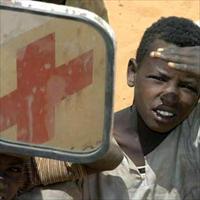Democratic Republic of the Congo: First food distribution for displaced people north-east of Rutshuru

Since 9 November the International Committee of the Red Cross (ICRC) has been distributing to more than 17,000 displaced people between Nyamilima and Ishasha some 208 tonnes of food – enough to cover their needs for the next 10 days.
The area, along the border with Uganda about 100 kilometres north-east of the city of Goma, has recently been the scene of an influx of thousands of men, women and children fleeing the fighting in North Kivu, among them many pregnant women and children who lost their parents as they fled.
"The people arriving have lost everything, and often have to spend the first few nights on the ground in churches or schools," said Ian Byram, the ICRC's relief coordinator in the Congo. "They are completely exhausted after walking several days in search of safety."
The ICRC, with support from the Red Cross Society of the Democratic Republic of the Congo, is for the time being the only humanitarian organization responding to their urgent need for food. The ICRC is also delivering surgical and other medical supplies to Nyamilima's hospital, while the first cases of diarrhoea are being reported. Every day, more displaced people converge on Nyamilima from the cities of Rutshuru and Kiwanja, where fighting has recently taken place.
"We are afraid. We don't know when we'll have to flee again," said Angélique, a young mother of three children who arrived in Nyamilima yesterday. "We have already had to move eight times since the month of September."
On 9 November the ICRC also resumed its distribution of food aid in the Kibati area, 15 kilometres north-east of Goma. On 7 November, after two days of supplying flour, oil, beans and salt, it had to suspend the operation temporarily when armed clashes broke out within a few kilometres of the distribution site. At the time of the interruption, approximately 25,000 of the 65,000 displaced people in Kibati had received rations providing enough to live on for at least 10 days. The distribution will be completed today.
"The security situation in the Rutshuru and Masisi areas of North Kivu, and even in the city of Goma, remains highly unstable and is having an effect on all humanitarian activities over the long term," said Luc Haas, in charge of ICRC activities in Goma. "In view of this major difficulty, we are doing everything we can to bring aid to the displaced. We are again reminding the warring parties that they have an obligation under international humanitarian law to protect the civilian population and to facilitate the passage of relief supplies."
 Back and Next - Back and Next
Back and Next - Back and Next See Also - See Also
See Also - See Also